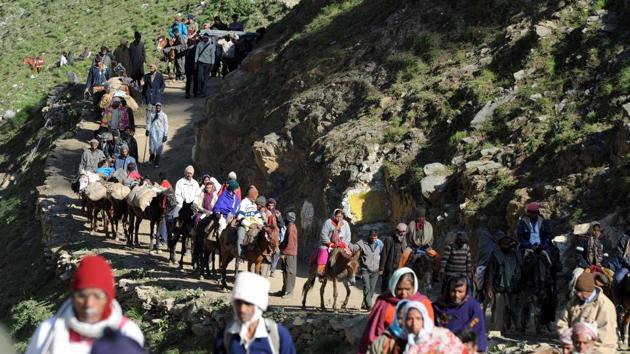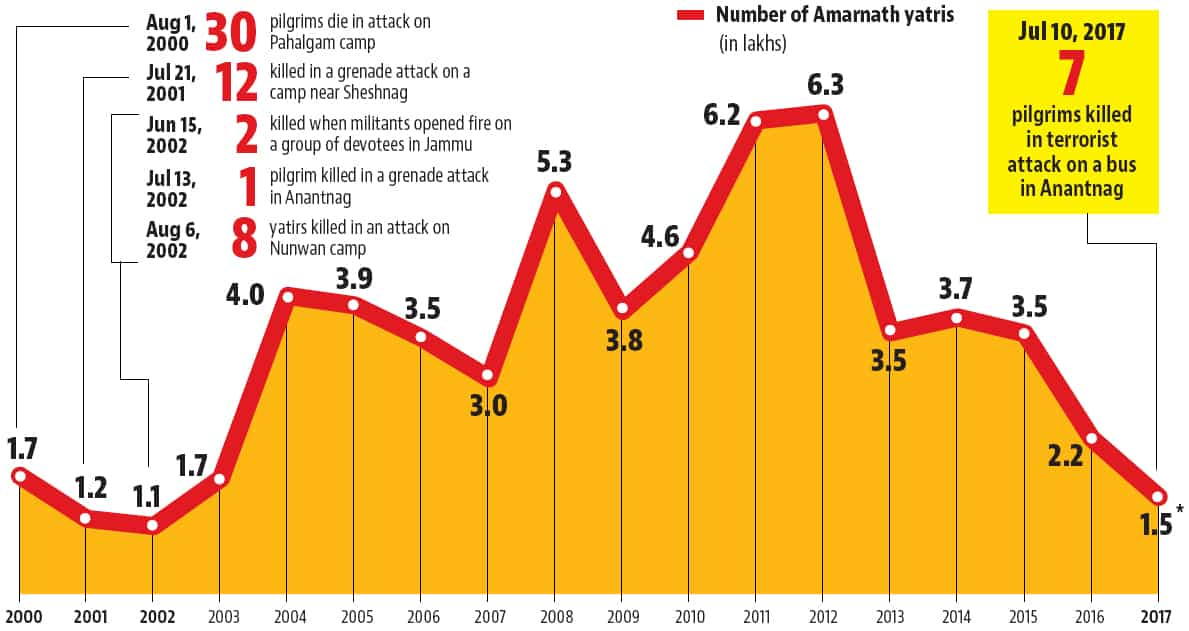‘What harm did the Amarnath yatris do’: Disbelief, grief at Baltal base camp after terror attack
At the Baltal base camp of the Amarnath pilgrimage, people struggle to come to terms with Monday night attack that left seven pilgrims dead.
A resident of Uttar Pradesh, Dharam Pal is as much at home in mountainous Baltal as in the fertile plains of his hometown of Saharanpur.

On Tuesday, Pal struggled to control his tears and come to terms with the killing of seven Amarnath pilgrims at Batengoo, 150km from Baltal, the night before.
“What harm did those yatris do to the militants? They had come to Kashmir to pray but now their bodies have gone back home,” said Pal, who has been running a free kitchen, or a langar, at the Baltal base camp during the Amarnath Yatra for 18 years.
Baltal in Jammu and Kashmir is the shorter but high-altitude route to the revered Hindu shrine, which is 14km away. The mountain camp is also the last point till which vehicles can go. The remaining journey is either done on foot or ponies.
The bus that was attacked by terrorists also came from Baltal, packed with devotees who had paid obeisance at the Himalayan shrine.
Manning the desk of the Sri Mahadev Seva Samiti, which he said fed around 2,000 pilgrims a day, Pal broke down as he talked about the strike that stunned the border state and rest of the country.
“If such incidents continue, will anyone ever come to Kashmir. What enmity do the militants have with pilgrims,” he said.
The assault comes at time when Kashmir is battling street protests and increased militant violence, which are keeping tourists away.
Also seen as a symbol of Kashmir’s syncretic culture, the pilgrimage has largely remained untouched by the decades of unrest in the Valley. Monday’s attack is the fourth such assault.
Pal was not alone. Disbelief, grief and sadness were hard to miss at Baltal. People did put up a brave face but fear was not too far behind.
“We have full faith in God that no harm will come to us but what has happened had created fear in our minds,” said Ramesh Kumar. A resident of Amritsar in Punjab, Kumar has been visiting the shrine for 17 years.
Two couples from Surat in Gujarat said they were at the Himalayan shrine when pilgrims were hit. Their families were frantic as the bus that was fired upon was registered in Gujarat and three of the dead were also from that state.
“We came down this morning and our phones have been ringing constantly. People have been calling from home, asking if we are fine,” said Dinesh Jariwala. “We are a bit worried about going back but we hope things will fine.”
A group from Muradabad in Uttar Pradesh had similar concerns. “We had been advised against leaving for Jammu today, and so we are staying back,” Ashish Singh said.
A shutdown was called in Jammu on Tuesday in protest against the killings.
The 40-day pilgrimage, also known as the Amarnath Yatra, began on June 29. The government said more than 35,000 troops were being deployed to protect the twin pilgrimage routes. This year, police are using drone-mounted surveillance cameras, jammers, dog squads, bullet-proof bunkers, satellite tracking devices and other gadgets to secure the pilgrimage in view of increased militancy and violence in the Valley.






